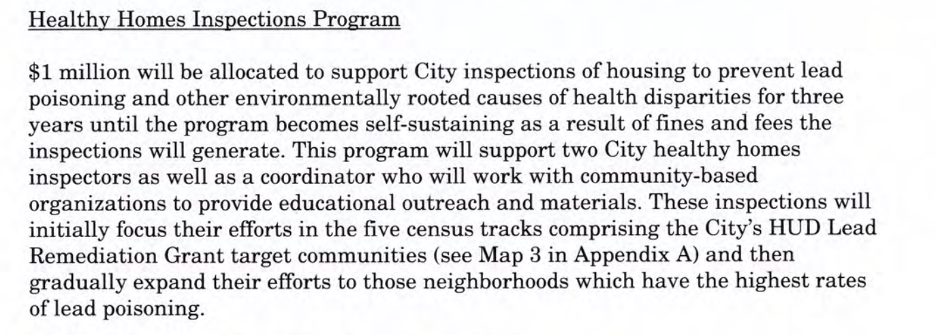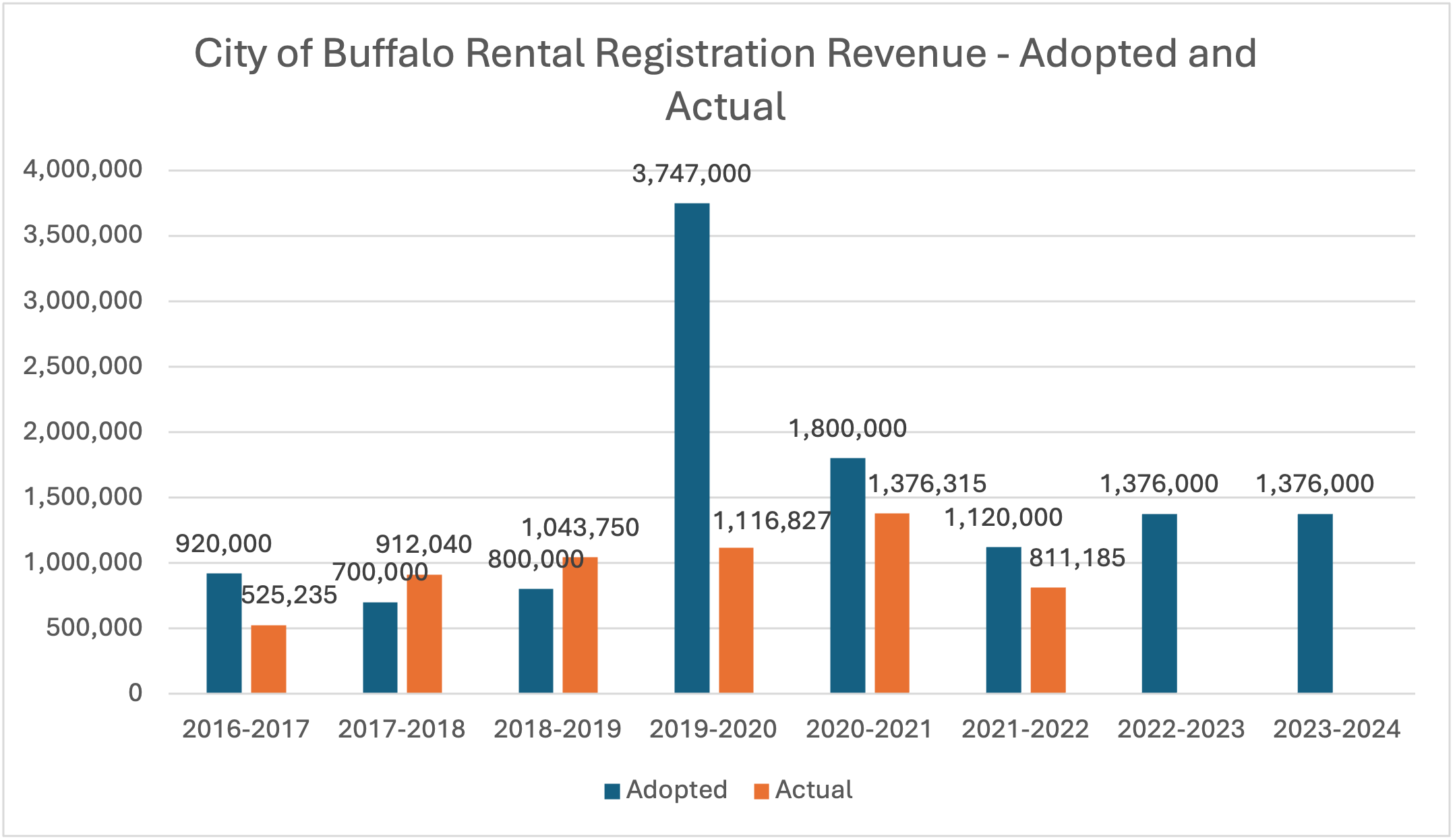News Take Action
How the City Can Pay for Proactive Rental Inspections - Memo to the Council
| Date: | March 28, 2024 |
| Share: |
We prepared this memo for the Buffalo Common Council to explore potential funding options for the Proactive Rental Inspection (PRI) program. It discusses modestly increasing the city's rental registry fee, using American Rescue Plan funds, and several other funding options. We sent this memo along with a letter to the council in response to the Commissioner's 2024 PRI report.
How the City Can Pay for Proactive Rental Inspections
by Sarah Wooton and Andrea O Suilleabhain
The City of Buffalo’s Commissioner of the Department of Permits and Inspections Services (DPIS) says that the Proactive Rental Inspections (PRI) program would cost the city $2 million annually—about 0.35% of the City’s budget.[i] There are several ways that the city could pay for this program.
#1 Update the Rental Registry
Background
- The City of Buffalo requires all non-owner-occupied single and double rentals to register annually with the Rental Registry. The fee to register is $25 for singles and $50 for doubles.[ii] Owners who fail to pay incur a late fee (an additional $25 for singles and $50 for doubles) 30 days after the due date.[iii]If the owner fails to pay 60 days after the due date, they are charged an additional $75.
- As of December 2023, the rental registry had about 9,000 singles and 14,000 doubles.[iv] The city projects that for fiscal year 2023 – 2024, it can collect $1.376 million.[v]
- About 45% of these structures were still marked unpaid as of December 18, 2023.[vi]
Proposed Change:
- We propose a modest increase in the annual fee: $50 for singles and $100 doubles. In just the past five years, rent in the City of Buffalo has increased significantly. According to Zillow’s data, between December 2018 and 2023, Buffalo’s average rent increased by $371—meaning a landlord would bring in an additional $4,452 annually.[vii] An increase of $25 per unit annually is a small price to pay given the return that landlords are receiving in recent years. This is also a far lower fee increase than the Council’s recent hike for short-term rental licenses.[viii] With increased fees, the city could collect in excess of $2 million a year.
- The city could also engage in a more robust process to ascertain new rentals.
#2 Remaining American Rescue Plan Funds
The City of Buffalo had a unique opportunity to fund the PRI program with federal funding received under the American Rescue Plan. The City received $331 million in ARP funding, and allocated only $1 million of that to healthy homes inspections in its initial spending plan, excerpted here[ix]:

In the March 26 Common Council Finance Committee, Delano Dowell, Commissioner of Administration and Finance, reported that the City of Buffalo had spent $153 million and obligated $195 million of its $331 million in funds. This leaves $136 million in federal funds not yet obligated or spent. From this amount, the City could allocate ample funds to fast-track the PRI program.
As the Buffalo News has covered, the City has made significant changes to its initial spending plan across many target areas of focus, cutting and reallocating funds among different program areas. The City has the flexibility and authority to allocate ARP funds to advance PRI implementation.
Additional Funding Considerations
- According to Ch 242-12(A) of city code, after a property has been inspected twice and the violations haven’t been fixed or haven’t progressed, the landlord must pay $75 for that second inspection and any inspections that follow.[x] It is not clear to us that DPIS is charging this fee. Given the volume of inspections that DPIS must do under PRI, this could be a significant source of revenue.
- Ch 242-13 allows the city to turn housing code fines into a lien against the rental property through the tax roll.[xi] For particularly bad landlords who ignore city fines, this could be an effective tool for collecting the funds and—if the landlord still refuses to pay—ultimately holding the landlord accountable through foreclosure. To our knowledge, this tool is not being used.
- When inspectors cite landlords for violations, and landlords fail to make the repairs, landlords have to pay fines to the city. If PRI were effectively implemented, we’d see a significant increase in fine revenue to the department. This could offset the cost of the program. See ch 137-7 of the city’s code for a full list of ticket-able offenses, including failure to comply with proper smoke detectors, chipping and peeling paint, infestation and rodents.
- If PRI were effectively implemented, Buffalo’s housing stock would improve, and the city would see reductions in 3-1-1 calls for interior inspections. As a result, there would be a reduction in inspector labor necessary to handle those 3-1-1-initiated inspections, thus decreasing costs for the department.

[i] Calculated based on City’s 2023-2024 budget of $577 million
[ii] Ch 264-19 (A) of the 2020 amendment, not yet represented in the city code online
[iii] Ch 264-10 (A) of the 2020 amendments, not yet represented in the city’s code online
[iv] Open Data Buffalo Rental Registry, downloaded December 18, 2023, https://data.buffalony.gov/Quality-of-Life/Rental-Registry/hpqg-ihzt/about_data
[v] City of Buffalo Budget 2023-2024, Department of Permits and Inspection Services, http://www.buffalony.gov/ImageRepository/Document?documentId=12001
[vi] Open Data Buffalo Rental Registry, downloaded December 18, 2023, https://data.buffalony.gov/Quality-of-Life/Rental-Registry/hpqg-ihzt/about_data
[vii] Calculations based on Zillow’s ZORI data for the City of Buffalo
[viii] https://buffalonews.com/news/local/buffalo-common-council-increases-fees-and-fines-for-short-term-rental-properties/article_0c993d60-d0e7-11ee-b55b-c369734d80c2.html
[ix] City of Buffalo American Rescue Plan Act Spending Plan, p. 12, https://www.buffalony.gov/DocumentCenter/View/9799/ARP-Spending-Plan-2021
[x] See Ch 242-12 (A) of the 2020 amendments, not yet represented in the city code online
[xi] See Ch 242-13 of the 2019 amendments, not yet represented in city code online